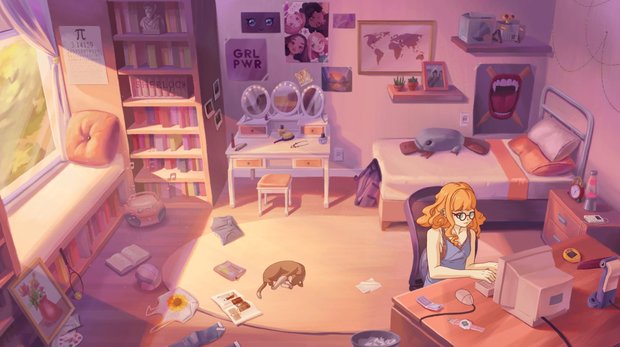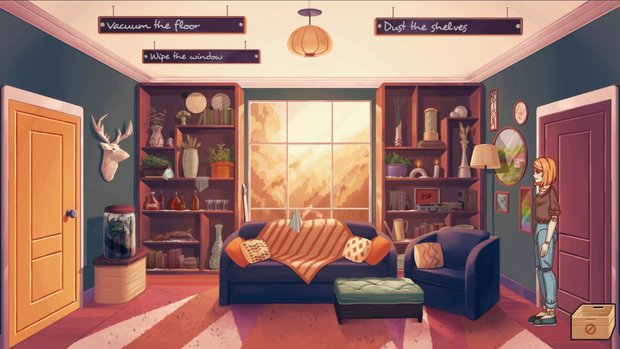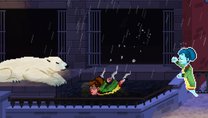Leila review

- 2 Comments
Slow-paced, puzzle-rich and emotionally poignant reflection on one woman’s life makes for a memorable experience
Leila is fundamentally the exploration of the life of a woman, of both the joys and the traumas she’s experienced over the years. Each of its distinct episodes is portrayed from the perspective of the child or younger woman she was then, but framed in the present by her understanding as an older woman. It’s a point-and-click adventure, but exploring serious themes and certainly not typical of the genre. Over the course of the game, we gain real sympathy with Leila, and through a nice variety of different gameplay elements come to a sense of appreciation and fellow-feeling with her.
At Leila’s inception, the eponymous unseen protagonist tells us that her daughter has given her a videogame that somehow taps into one's unconscious and lets you revisit scenes from your life. Hands reach out and take a box with two screens, and we transition to a forest scene. It’s as if you are donning a VR headset, although the game is not and does not require VR.
A linear first-person forest path is used to transition between episodes by moving through the woods, slideshow-style, until you find a sign pointing to the next. Some of the trees have silver veins, and clicking on one reveals a still image representing a different memory.

Each third-person, single-screen episode occurs at a different point in Leila’s life: childhood, teen years, early motherhood, and so on, not arranged in chronological order but switching around at times. For example, the first episode you encounter is as Leila as a mature woman, trying to write a novel; the second may be of her as a young girl, playing a videogame. You do not encounter her life in sequential order, but at the key moments that molded her. Years of marriage and housework recur, but with very different emotional moods depending on her mental state. Most scenes besides the forest path for navigation between episodes are set in interior places: Leila’s childhood home, her house where her husband and daughter live, a coffee shop, and so on.
In general, each episode involves some puzzle-solving that has an emotional resonance for Leila at that particular age, but also ends in a sting, an emotional and sometimes upsetting event that shapes the course of her life. For example, as a child, she witnesses her Dad with another woman; as a teenager, she is shocked when her boyfriend dumps her; as an adult, she initially feels comfort from the boring nature of housework, but later, when experiencing depression she can barely get herself through the day. The point, really, is to show what drags her down, and how she has the resilience to build herself back up and persevere.

While there’s no dialog per se, there is narration. Throughout the game, Leila’s voice both comments on the current episode and muses philosophically about life and relationships. So in a sense the game is fully voiced, but Leila is the only one who speaks (although different actors voice her as a child, teenager, and grown woman). The voice is calm, a little cynical, appealing and well-acted, though the lack of any communication with other characters (except with her Mom in the distance at one point) is an odd, if interesting, design choice. Music is also appealing, in a gentle, lo-fi way; most of the time conveying a sense of serenity, but becoming more jagged and harsh during more traumatic sequences.
Gameplay is unusual for a point-and-click adventure: There’s no inventory, use of items to solve puzzles, or even character interaction. There are, however, many and very different puzzles and activities. The first one I encountered was a hidden object task, which made my heart sink a bit; hidden object games are so cliché, and for me, at least, quite boring, and I feared that they would be the heart of the game. In fact, while they do appear again, there’s quite a diversity in the nature of the game’s challenges.
The most complicated one is a version of the Tower of Hanoi, which builds on that classic puzzle by adding additional complications (and is the most challenging puzzle sequence in the game). Another involves you selecting tropes for a novel you are writing from a palette on the left, generating a text outline of your book, then sending it to an editor, trying to find a combination they are willing to publish, which is kind of interesting. It can be brute-forced if you get stuck, though.
The puzzles and their solutions are usually fairly intuitive, but may require a bit of exploration of the episode space to figure them out. There’s no key that reveals hotspots, but there is a “Help” icon in the upper left that you can use if you require it. It often puts a square around an area you need to investigate, so the functionality is a bit different from “press key to show hotspots,” but it works tolerably well.

Some aspects of the game are very mundane; the banality of housework is one such element. Some are much more surreal, attempting to replicate emotional issues in the form of puzzles, for example manipulating objects that have meaning for the character in 3D to dispel the despair they inspire. As you find the right angle for each, they dissipate (but you must address them in order, with a subtle pulse indicating where you need to go next). Most of the game is 2D, but some of the more surreal elements are 3D. The surreal episodes are meant to reflect the emotional trauma Leila feels at various times. On one occasion with Leila still a child, you apparently get trapped inside a TV after playing a videogame, and have to manipulate surrounding elements to free yourself.
These episodes are often dark and a bit alarming, but the “real life” episodes, even when some traumatic elements are present, are brightly lit in mostly pastel colors. Just looking at these scenes without context, you’d assume Leila was a “cozy” game, but while moment-to-moment gameplay is fairly cozy most of the time, the overall experience is definitely not. Still, by game’s end, Leila has come to terms with her life and is at peace with herself; the ending sequence is hopeful in an “I can live, learn, and take care of myself” kind of way.
Episodes are typically around a half hour in length, so a typical playtime should take about 4-5 hours. The one element of the game that I found problematic is that the auto-save checkpoints are far and few between. I lost half an episode’s progress by shutting the game down; manual saves would certainly have been an improvement, or at least an auto-save upon exiting. Some players may find the pace a bit slow-moving; there’s no ability to skip narration, and quite often the character will go through a mini-cutscene before the controls get handed back to you. There’s not a lot of replayability, but of course that’s pretty common in adventure gaming.
Final Verdict
Leila is an unusual slice-of-life game with real emotional resonance and considerable polish. And it’s unusual for a point-and-click game: not humorous, not horrific, and no detective crime-solving to do, just a quiet exploration of one woman’s life experiences and the wisdom they inspire. The story is essentially an older woman’s meditation on the course of her life and the struggles she faced, as well as the joys she took from it, exploring themes like teen angst, fear of accomplishment, and the despair of an imperfect marriage. Leila is a sympathetic character, and the challenges and issues she has to deal with over the course of her life, including crippling depression at one point, only make you feel for her all the more. If you’re willing to deal with its gentle pacing and occasionally traumatic occurrences, you’re in for a very different experience with a sympathetic main character.
Hot take
Leila is not a conventional graphic adventure but is quite polished in its narrative approach, as well as in its diverse puzzles, fostering real emotion and connection to its character.
Pros
- Intelligent, diverse puzzle design
- Personal journey is emotionally impactful
- Excellent voice acting
- Decent, if not amazing, visuals and music
Cons
- Scenes are fairly static, without much in the way of animation
- Auto-saves are spaced too far apart
Greg played his own copy of Leila on PC.











2 Comments
Want to join the discussion? Leave a comment as guest, sign in or register in our forums.
Even though there's a chance I might bounce off this hard (as I sometimes do with slice of life art), I'm interested in trying it just because it seems so different, and because the "intelligent and diverse puzzle design" promises a bit more game play engagement than most games with this sort of subject matter. Thanks for the review.
Reply
My pleasure.
Reply
Leave a comment